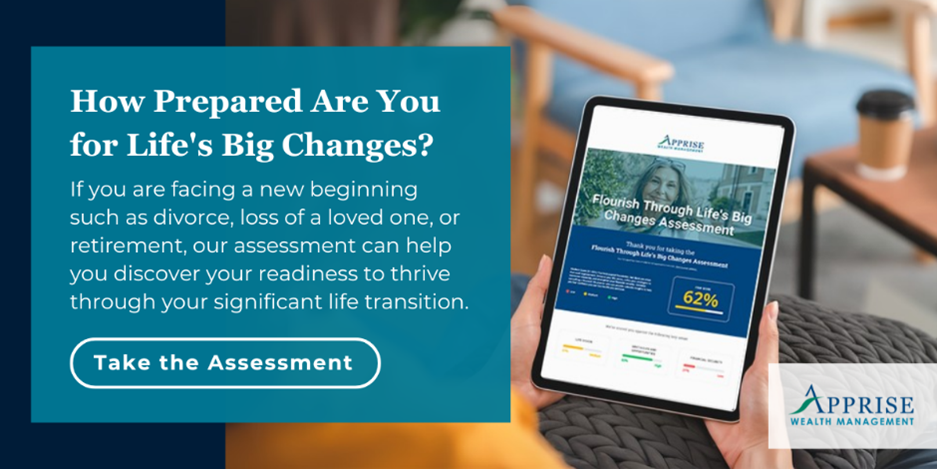When someone first reaches out to me for help with their finances, they usually begin with practical concerns like:
- “I need to get my investments in order.”
- “I’m worried about taxes in retirement.”
- “Am I saving enough?”
- “When can I retire?”
- “Do I have ‘enough’ to retire?”
These are valid concerns. But they’re rarely the real issue.
At Apprise, we don’t stop at the surface. We look deeper—because life-centered financial planning isn’t just about numbers. It’s about creating a life that feels meaningful, free, and secure. It’s also about aligning how you use your TEAM of resources (Time, Energy, Attention, and Money) with your values.
The Problem Beneath the Problem
- When you say you want help with your portfolio, what you might really be asking is:
“Can I stop working soon without running out of money?”
- If you’re worried about taxes, maybe the real fear is:
“I don’t want to be a burden to my children.”
- When you ask, “Am I on track?” what you might really be wondering is:
“Can I live the life I’ve imagined?”
- If you’re wondering when you can retire, your real question could be:
“Am I financially secure enough to retire and still maintain my current lifestyle?”
- While asking whether you have “enough” to retire sounds like a numbers question, it is rarely just about money. Instead, you might be asking:
“Is it safe to stop saving and start spending?”
Money is never just about dollars and cents—it’s a tool for building a life you love. And yet, in times of transition—whether it’s widowhood, divorce, an empty nest, or retirement—it’s easy to focus solely on the urgent tasks at hand. We zoom in on to-do lists and overlook the bigger picture.
Life Transitions Change the Questions
For women facing a significant life change, financial decisions often carry a deeper emotional weight. You’re not just rebalancing an account or reworking a budget—you’re redefining your life.
- After a divorce, you may be learning to make financial decisions on your own for the first time in years—or ever.
- As a widow, you may be navigating not only loss but also uncertainty about what your future may hold.
- When your nest is suddenly empty, you may wonder what comes next and how to make the most of your newfound time and freedom.
- If you’re entering retirement, the question often shifts from “How do I save?” to “How do I make this season of life truly count?”
These transitions can appear disorienting. But they also create an opening—a chance to reimagine what you want the next chapter to look like.
That’s where values-based financial planning becomes so valuable. It can help you answer the questions that matter most:
- Who am I now?
- What do I want from this next phase?
- What kind of life seems right—for me?
Aligning Your TEAM with Your Values
You have more than money to manage. You also have Time, Energy, and Attention—the rest of your TEAM.
These four resources are finite. And how you use them says a lot about what you truly value. When your TEAM is misaligned, life can feel scattered, overwhelming, or unfulfilling. But when it’s aligned, your decisions flow more naturally. You think more clearly, feel calmer, and are more in control.
Also, remember that time is the most finite of all resources. You can benefit from trading money for time.
One of my favorite examples of how this works goes back to when we first bought the house we live in today.
An Example of How This Works
The previous owner had a tractor that she used to cut the grass. I bought it thinking I would cut the grass myself to save money. It was taking me three hours, and I wasn’t finishing the job. The only joy it brought was having one of our kids sit on my lap while I cut the grass.
My wife found someone who agreed to do the job for $40. Deciding to let him cut the grass instead was a “no-brainer.” That equated to $13.33 an hour. I knew my time was worth considerably more.
I knew it wouldn’t take him three hours, as he had better equipment. But that didn’t matter. Three hours of my time for $40 was an easy trade-off. I wasn’t just outsourcing to save time. I was choosing to redirect my energy and attention toward what mattered more.
When faced with these types of decisions, ask yourself:
- Am I spending my time on things that bring me joy or just fill my calendar?
- Where is my energy going—and is it fueling or draining me?
- What’s capturing my attention? Is it what matters most or just what’s loudest?
- Is my money supporting the life I want or maintaining a life I’ve outgrown?
Creating a life plan means ensuring your TEAM is working for you, not against you.
Reclaiming Your Time and Energy During Life Transitions
And this idea isn’t limited to cutting grass. It applies to many of the responsibilities you carry.
For many women, especially during times of transition like divorce, widowhood, or an empty nest, long-held roles around household management and caregiving may come into question. You might find yourself doing everything because you always have or because it feels like you should. But this is also a time to pause and reassess: Is this the best use of my Time, Energy, Attention, and Money? Delegating tasks like home maintenance, cleaning, or even caregiving doesn’t mean you’re letting go of responsibility. It means you’re creating space for what truly matters in this next chapter of life. It’s not just about saving time. It’s about reclaiming your life.
Don’t Just Plan Your Finances—Life-Centered Financial Planning Helps You Plan Your Life
Most people have a financial plan—or at least know they should have one. But fewer have a life plan.
A life plan helps you clarify what truly matters—your purpose, passions, and the people and experiences that bring you joy. It gives you a sense of direction. And it ensures that your financial decisions serve a greater purpose: they help you live a fulfilling and meaningful life.
Without a life plan, it’s easy to drift. To spend your days reacting instead of choosing. To let fear or uncertainty dictate your path. However, when you take the time to explore what you truly want—what enough looks like to you—you can begin to make choices with greater confidence and clarity.
Life-centered financial planning brings your financial strategy and your vision together, so every decision moves you closer to the life you want.
Your Values Are the Compass
Planning invites you to take a breath and ask:
- What kind of life do I want to live now?
- What brings me joy, meaning, and connection?
- What does “enough” look like to me?
Once we understand why your financial goals matter, we can build a plan that aligns your money, time, energy, and attention with your values. That’s when financial planning after life changes becomes truly personal—and powerful.
From Tactical to Transformational
Yes, we’ll take care of the details. We’ll help you optimize your taxes, refine your investments, and create a sustainable withdrawal strategy.
But we’ll also help you realign your TEAM. Because financial peace of mind isn’t just knowing your accounts are in order. It’s knowing that your life is, too.
Let’s Talk About What Really Matters
If you’re navigating a new beginning, you might feel pressure to “figure everything out.” You don’t have to do it alone. Together, we can go beyond the surface and uncover the real questions you’re trying to answer.
It’s not just about what you have.
It’s about what you want.
You deserve more than financial security.
You deserve clarity, freedom, and a life you love—on your terms.
Let’s create a life-centered financial plan for you.
Schedule a free call today.
Our practice continues to benefit from referrals from our clients and friends. Thank you for your trust and confidence.
If you would like to speak with us about financial topics, including facing new beginnings, managing your investments, creating your life plan, or saving for retirement, please complete our contact form or schedule a call or a virtual meeting via Zoom. We will be in touch.
Follow us:
Please note. We post information about articles that can help you make better money-related decisions on LinkedIn and Facebook.
For firm disclosures, see here: https://apprisewealth.com/disclosures/





